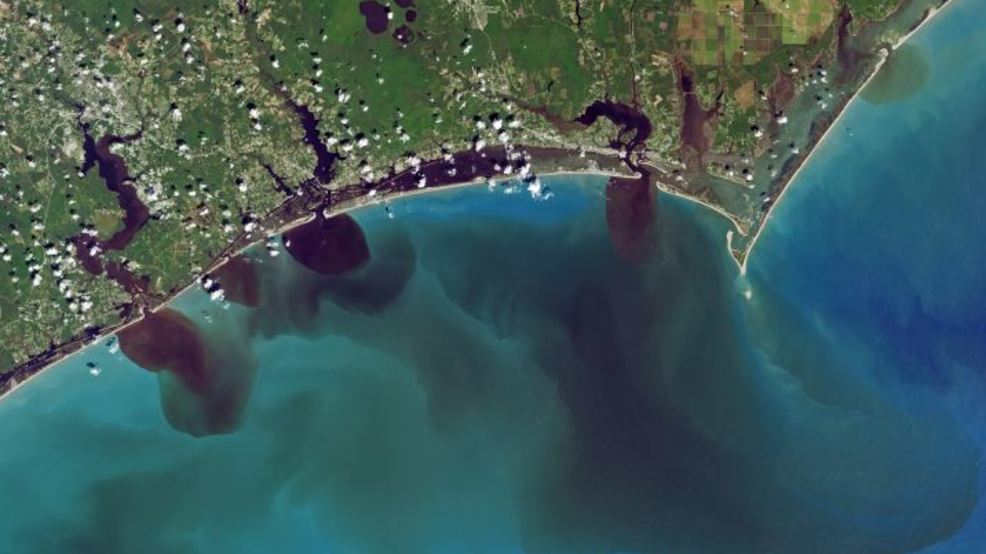Hog Farms Waste

Hog Waste
North Carolina is the center of America’s pork industry, with over 9.7 million pigs that produce 10 billion gallons of waste annually. When a pig in a large-scale farm urinates or defecates, the waste falls through slatted floors into holding troughs below. Those troughs are periodically flushed into an earthen hole in the ground called a “lagoon”—which contain a mixture of water, pig excrement, pig carcasses and anaerobic bacteria. The bacteria digest the slurry and also give lagoons their pink coloration.
By design, the lagoons are loaded with dangerous pathogens like e. Coli. When spread into flood waters and distributed widely, the toxic slurry is a significant threat to human health, and devastates aquatic ecosystems. In the wake of the storm, 50 lagoons are confirmed to have been breeched (releasing pig waste into the environment), with another 123 lagoons compromised and at imminent risk of doing so, according to data issued by the North Carolina Department of Environmental Quality. Some lagoons were even proactively drained in anticipation of Hurricane Florence.
Once unleashed, the waste creates “dead zones” in fresh water ecosystems, killing all manner of fish, birds, crustaceans, mammals and plants. The waste can also sicken rescue workers and families making their way to their damaged homes, and can permanently damage homes by leaving a revolting smell that is nearly impossible to remove.
The Grass Roots Way
We are resilient to disaster.
When a storm is headed to any of our small family farms, our farmers jump into action.Their task? Move each micro-herd to safety. Gathering 60 pigs and securing them in a tornado shelter is no easy task—but imagine doing so with 6,000 hogs? It is impossible. That’s why industrial pork producers abandoned hundreds of thousands of hogs to die in the storm—and at least 5,500 perished. It simply isn’t possible to care for thousands of animals in a disaster scenario.
We are safe for our local communities.
If you live next to a Grass Roots farm, what do you notice? Animals out on fresh pasture, being moved daily or weekly, and… That’s about it. If you live next to a hog CAFO (concentrated animal feeding operation), you’ll experience daily plumes of noxious, foul-smelling gas. You may even experience liquid sprays of hog waste, emanating from the sprinkler systems that pump and distribute the hog waste into the lagoons. In fact, communities have sued industrial hog producers over this practice—and won.
We are ecologically beneficial.
The reason Grass Roots farms don’t have waste lagoons is because a) we don’t raise more animals than the land can handle, and b) our hogs’ waste is integrated into the natural forest environment. Pigs are animals that like to root and dig. Their role in the ecosystem is to aerate soil, disrupt plant communities (making room for new plants), fertilize, and then… move on to the next plot of land. We mimic wild pigs’ behavior by moving our hogs every week, giving them fresh terrain to explore and ensuring their waste never piles up to unsustainable levels. This keeps our hogs clean and the land healthy.
We are less likely to harbor disease.
Because our hogs have clean bedding, daily exercise, and plenty of room to separate their bathroom area from where they rest and eat (did you know that pigs *never* defecate near where they eat if they have the choice?), our herds are naturally healthy and have minimal risk of disease. The opposite is true for hogs trapped in industrial farms—they have almost no room to move around, defecate where they sleep and eat, and are crammed with thousands of other pigs where disease can spread rapidly if present. In fact, the next great global pandemic is forecasted to be born on a factory farm, like swine flu was in 2010.
We are respectful of the pigs we steward.
Pigs are complex animals with rich social lives and behaviors. We do everything in our power to give them a natural, enjoyable life that is free from suffering. We believe this creates the best pork possible, and we also believe it’s the right thing to do. Factory farms, on the other hand, do not extend these benefits to their animals. Grass Roots bacon is naturally cured. It has no added nitrates or nitrites—other than those in the celery powder we use in our rub—and it’s full of delicious smokey flavor. So you can treat yourself and your family without worrying about unhealthy additives.



